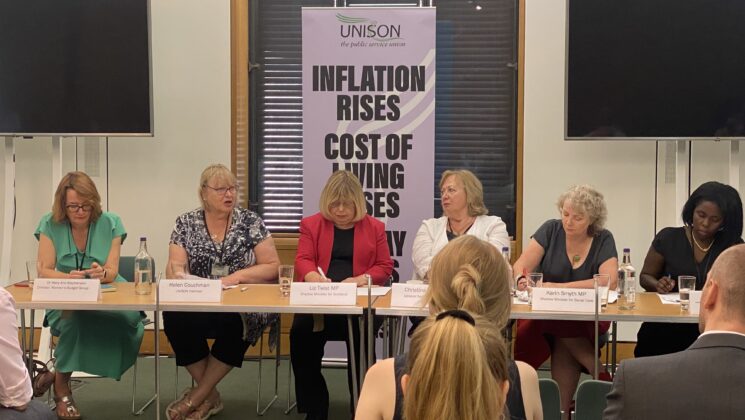General secretary Christina McAnea and UNISON members appeared at a special event in Westminster yesterday that examined how both the economy and gender equality can be boosted through investment in the social care sector.
‘Time to Care’ looked at the key components that make up the economic case for social care investment and reform – and why social care should be as important to our economic infrastructure as the roads and railways.
For example, more people work in social care than for the NHS – a huge workforce who spend their wages in local economies. Local job creation also reduces the need for travelling, making funding for care jobs also a green investment.
And, crucially, a properly funded social care system is vital to women: not only do they make up the majority of the care workforce, but women also take on the bulk of unpaid caring responsibilities, which reduces their ability to participate in paid employment.
As the UK seeks to recover from COVID-19 and to deal with the worst cost of living crisis in a generation, there is a pressing need for investment to be prioritised for those industries that have been particularly badly affected by the pandemic and those that can bring a boost to our flagging economy.
Social care ticks both of these boxes.
Vital for gender equality
Speaking at the event, general secretary Christina McAnea said: “At the peak of the COVID-19 pandemic, the government said they had put a ring of steel around social care, but this simply wasn’t true.
“As communities look to rebuild after lockdowns and as society struggles with the worst cost of living crisis in a generation, social care needs to be given a much higher priority than it is currently getting from the Westminster government.
“Not just because it is the right thing to do, but also because it is so intrinsic to our economy and our other public services, particularly the NHS and housing for example.
“A properly funded social care system is also vital to women. Not only do they make up the vast majority of the workforce, but it is also women who more often than men end up taking on unpaid caring responsibilities.”
Grasping the nettle
COVID has had a severe impact on the care sector. More than 44,000 people have died in care homes and the underpaid, undervalued workforce has been left cruelly exposed by a fragmented system showing all the signs of years of neglect.
UNISON believes the Westminster government has so far failed to grasp the nettle in terms of either investment in or meaningful reform of the care sector.
This represents a serious missed opportunity – most obviously for service users who are unable to access the care they need and for care workers who continue to suffer poor terms and conditions.
But it also fails to recognise that proper investment in social care should be considered a driver of economic recovery, rather than merely a burden to be borne by the exchequer.
On the panel alongside Christina (pictured, left to right) were: Dr Mary Ann Stephenson, Helen Couchman, Liz Twist MP, Karin Smyth MP and Councillor Evelyn Akoto.



